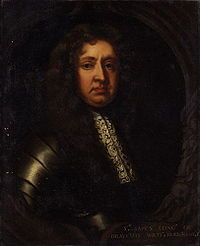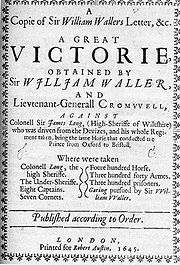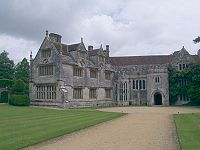
Sir James Long, 2nd Baronet
Encyclopedia

England
England is a country that is part of the United Kingdom. It shares land borders with Scotland to the north and Wales to the west; the Irish Sea is to the north west, the Celtic Sea to the south west, with the North Sea to the east and the English Channel to the south separating it from continental...
politician and Royalist
Cavalier
Cavalier was the name used by Parliamentarians for a Royalist supporter of King Charles I and son Charles II during the English Civil War, the Interregnum, and the Restoration...
soldier.
Born at South Wraxall
South Wraxall
South Wraxall Manor is a Grade I listed country house which dates from the early 15th century, located at South Wraxall in the English county of Wiltshire, near Bradford on Avon...
, Bradford-on-Avon, Wiltshire
Wiltshire
Wiltshire is a ceremonial county in South West England. It is landlocked and borders the counties of Dorset, Somerset, Hampshire, Gloucestershire, Oxfordshire and Berkshire. It contains the unitary authority of Swindon and covers...
, the son of Sir Walter Long (c.1594-1637) and Anne Ley (daughter of James Ley, 1st Earl of Marlborough
James Ley, 1st Earl of Marlborough
James Ley, 1st Earl of Marlborough was Lord Chief Justice of the King's Bench in Ireland and then in England; he was an English Member of Parliament and was Lord High Treasurer from 1624 to 1628. On 31 December 1624, James I created him Baron Ley, of Ley in the County of Devon, and on 5 February...
), he was educated at Magdalen College
Magdalen College, Oxford
Magdalen College is one of the constituent colleges of the University of Oxford in England. As of 2006 the college had an estimated financial endowment of £153 million. Magdalen is currently top of the Norrington Table after over half of its 2010 finalists received first-class degrees, a record...
, Oxford
Oxford
The city of Oxford is the county town of Oxfordshire, England. The city, made prominent by its medieval university, has a population of just under 165,000, with 153,900 living within the district boundary. It lies about 50 miles north-west of London. The rivers Cherwell and Thames run through...
, and admitted to Lincoln's Inn
Lincoln's Inn
The Honourable Society of Lincoln's Inn is one of four Inns of Court in London to which barristers of England and Wales belong and where they are called to the Bar. The other three are Middle Temple, Inner Temple and Gray's Inn. Although Lincoln's Inn is able to trace its official records beyond...
in 1634. At his father's death in 1637, Long inherited the bulk of his Wiltshire estates, including the manor of Draycot Cerne.
Career
Long held the following offices:- High Sheriff of WiltshireHigh Sheriff of WiltshireThis is a list of High Sheriffs of Wiltshire.Until the 14th century the shrievalty was held ex officio by the castellans of Old Sarum.-To 1400:*1066: Edric*1067-1070: Philippe de Buckland*1085: Aiulphus the Sheriff*1070–1105: Edward of Salisbury...
1644 - MPMember of ParliamentA Member of Parliament is a representative of the voters to a :parliament. In many countries with bicameral parliaments, the term applies specifically to members of the lower house, as upper houses often have a different title, such as senate, and thus also have different titles for its members,...
for ChippenhamChippenham (UK Parliament constituency)Chippenham is a parliamentary constituency, abolished in 1983 but recreated in 2010, and represented in the House of Commons of the Parliament of the United Kingdom. It elects one Member of Parliament by the first past the post system of election... - MP for MalmesburyMalmesbury (UK Parliament constituency)Malmesbury was a parliamentary borough in Wiltshire, which elected two Members of Parliament to the House of Commons from 1275 until 1832, and then one member from 1832 until 1885, when the borough was abolished.- MPs 1275–1508 :...
1679, 1681, 1690-92 - Gentleman of the Privy ChamberPrivy chamberA Privy chamber was the private apartment of a royal residence in England. The gentlemen of the Privy chamber were servants to the Crown who would wait and attend on the King and Queen at court during their various activities, functions and entertainments....
1673-85
He succeeded his uncle Sir Robert Long
Sir Robert Long, 1st Baronet
Sir Robert Long, 1st Baronet was a courtier, administrator and politician in 17th century England.He was the son of Sir Walter Long of South Wraxall and Draycot in Wiltshire, and his wife Catherine Thynne of Longleat...
as 2nd Baronet by special remainder
Remainder (law)
A remainder in property law is a future interest given to a person that is capable of becoming possessory upon the natural end of a prior estate created by the same instrument...
in 1673.
Sir James was also a magistrate
Magistrate
A magistrate is an officer of the state; in modern usage the term usually refers to a judge or prosecutor. This was not always the case; in ancient Rome, a magistratus was one of the highest government officers and possessed both judicial and executive powers. Today, in common law systems, a...
. His friend, the historian John Aubrey
John Aubrey
John Aubrey FRS, was an English antiquary, natural philosopher and writer. He is perhaps best known as the author of the collection of short biographical pieces usually referred to as Brief Lives...
wrote: "When there was a Cabal
Cabal
A cabal is a group of people united in some close design together, usually to promote their private views and/or interests in a church, state, or other community, often by intrigue...
of Witches detected at Malmesbury they were examined by Sir James Long and committed by him to Salisbury
Salisbury
Salisbury is a cathedral city in Wiltshire, England and the only city in the county. It is the second largest settlement in the county...
Gaole. I think there were seven or eight old women hanged".
Capture by Waller

English Civil War
The English Civil War was a series of armed conflicts and political machinations between Parliamentarians and Royalists...
; later rising to the rank of Colonel of horse in Sir Francis Dodington's brigade. In 1645, he escorted the Prince of Wales
Prince of Wales
Prince of Wales is a title traditionally granted to the heir apparent to the reigning monarch of the United Kingdom of Great Britain and Northern Ireland and the 15 other independent Commonwealth realms...
to Bristol
Bristol
Bristol is a city, unitary authority area and ceremonial county in South West England, with an estimated population of 433,100 for the unitary authority in 2009, and a surrounding Larger Urban Zone with an estimated 1,070,000 residents in 2007...
, and while returning to Devizes
Devizes
Devizes is a market town and civil parish in Wiltshire, England. The town is about southeast of Chippenham and about east of Trowbridge.Devizes serves as a centre for banks, solicitors and shops, with a large open market place where a market is held once a week...
he was overtaken by a superior force of Parliamentarians
Roundhead
"Roundhead" was the nickname given to the supporters of the Parliament during the English Civil War. Also known as Parliamentarians, they fought against King Charles I and his supporters, the Cavaliers , who claimed absolute power and the divine right of kings...
under Waller
William Waller
Sir William Waller was an English soldier during the English Civil War. He received his education at Magdalen Hall, Oxford, and served in the Venetian army and in the Thirty Years' War...
and Cromwell
Oliver Cromwell
Oliver Cromwell was an English military and political leader who overthrew the English monarchy and temporarily turned England into a republican Commonwealth, and served as Lord Protector of England, Scotland, and Ireland....
; he fell rapidly back towards Bath, hotly pursued by Waller; but was intercepted by Cromwell, and the high thick-set hedges prevented his escape. He was captured, but soon exchanged.
At the same time his manor at Draycot was sequestrated
Sequestration (law)
Sequestration is the act of removing, separating, or seizing anything from the possession of its owner under process of law for the benefit of creditors or the state.-Etymology:...
by an Act of Parliament
Act of Parliament
An Act of Parliament is a statute enacted as primary legislation by a national or sub-national parliament. In the Republic of Ireland the term Act of the Oireachtas is used, and in the United States the term Act of Congress is used.In Commonwealth countries, the term is used both in a narrow...
, but restored to him in 1649 on payment of a £700 fine. Not long after this, according Aubrey, "Oliver Cromwell, Protector, hawking at Howneslowe Heath, discoursing with him (Sir James Long), fell in love with his company, and commanded him to weare his sword, and to meet him a hawkeing, which made the strict cavaliers look on him with an evill eye".
Family
He married firstly, Anne, daughter of Sir William Dodington. There were no children from this marriage. He married secondly, c1640, Dorothy, daughter of Sir Edward Leech (or Leche) of ShipleyShipley, Derbyshire
Shipley is a village in the south-east of Derbyshire in the East Midlands of England. Since 1974 it has been part of the Borough of Amber Valley.Shipley separates the Ilkeston and Heanor urban areas, which are linked by the main A6007 road...
, Derbyshire
Derbyshire
Derbyshire is a county in the East Midlands of England. A substantial portion of the Peak District National Park lies within Derbyshire. The northern part of Derbyshire overlaps with the Pennines, a famous chain of hills and mountains. The county contains within its boundary of approx...
. They had five daughters and one son including:
- Anna Margaretta (c.1637-1717) married Sir Richard Mason (c1633-1685)
- Dorothy (c.1650-) married Sir Henry Heron of Surfleet, Lincolnshire
- James Long (1652-c.1690)
Death
Sir James Long died on 22 January 1692 from apoplexyApoplexy
Apoplexy is a medical term, which can be used to describe 'bleeding' in a stroke . Without further specification, it is rather outdated in use. Today it is used only for specific conditions, such as pituitary apoplexy and ovarian apoplexy. In common speech, it is used non-medically to mean a state...
and was succeeded as 3rd Baronet by his 19 year-old grandson Robert Long. Robert died of smallpox
Smallpox
Smallpox was an infectious disease unique to humans, caused by either of two virus variants, Variola major and Variola minor. The disease is also known by the Latin names Variola or Variola vera, which is a derivative of the Latin varius, meaning "spotted", or varus, meaning "pimple"...
four days after his grandfather. Robert's brothers Giles and James
Sir James Long, 5th Baronet
Sir James Long, 5th Baronet was an English politician.The son of James Long and his wife Susan Strangways, he was baptised at Melbury, Dorchester, Dorset in 1682. Long was Member of Parliament for Chippenham in 1705, 1707, 1708, and 1710, and for Wootton Bassett in 1714...
became successively 4th Baronet and 5th Baronet.
The baronetcy became extinct in 1805 on the death of the 10-year-old 8th Baronet, son of Sir James Tylney-Long, 7th Baronet
Sir James Tylney-Long, 7th Baronet
Sir James Tylney-Long, 7th Baronet was an English politician.The eldest son of Sir Robert Long, 6th Baronet and his wife Emma Child, he succeeded his father as 7th Baronet on 10 February 1767, and inherited the family estates, including the manors of Draycot and Athelhampton.- Career :He was a...
.
James Long Esquire, his only son

Athelhampton
Athelhampton is a Grade I listed 15th-century manor house in England. It is a privately owned country house on 160 acres of parkland, located five miles east of Dorchester, Dorset...
in Dorset
Dorset
Dorset , is a county in South West England on the English Channel coast. The county town is Dorchester which is situated in the south. The Hampshire towns of Bournemouth and Christchurch joined the county with the reorganisation of local government in 1974...
(also known as Admiston or Adminston), which had been inherited from Sir Robert Long in 1673. James married firstly, Susanna Strangways, daughter of leading civil war politician Colonel Sir Giles Strangways of Melbury, Dorset, a wealthy neighbour at Athelhampton. They had three daughters (Susan, Dorothy and Anne
Anne Long (c.1681-1711)
Anne Long , was born at Draycot Cerne, Wiltshire, one of six children of James Long and his wife, Susanna, née Strangways. A celebrated beauty, she was the granddaughter of Sir James Long, 2nd Baronet, and of another leading civil war politician, Giles Strangways...
), and three sons (Robert, Giles and James
Sir James Long, 5th Baronet
Sir James Long, 5th Baronet was an English politician.The son of James Long and his wife Susan Strangways, he was baptised at Melbury, Dorchester, Dorset in 1682. Long was Member of Parliament for Chippenham in 1705, 1707, 1708, and 1710, and for Wootton Bassett in 1714...
) but the marriage was not a happy one. James was a gambler and a drinker, and Susanna and the children often retreated to her parents home at Melbury.
After a by-election for the seat of Aldborough
Aldborough (UK Parliament constituency)
Aldborough was a parliamentary borough located in the West Riding of Yorkshire, abolished in the Great Reform Act of 1832. Aldborough returned two Members of Parliament from 1558 until 1832....
(the Longs had estates and interests in Yorkshire
Yorkshire
Yorkshire is a historic county of northern England and the largest in the United Kingdom. Because of its great size in comparison to other English counties, functions have been increasingly undertaken over time by its subdivisions, which have also been subject to periodic reform...
), Sir Henry Goodricke notified the newly elected member Sir John Reresby in December 1674 that: "Wee both have the satisfaction to be asured that Sir James Long and his son have both forfeited their interest with Coll. Strangeways; the father by high unkindnesse and folly, the son by hard usage of his wife, who has betaken herselfe wholy to her father's (Strangeways) house, and by the foolish losse of ₤15,000 in one year at play, in so much that hee dare not stirr out of his house in the country"
James appears to have continued his errant ways, when a further incident occurred in 1683. Certain affidavits were taken in connection with a Chancery suit
Court of Chancery
The Court of Chancery was a court of equity in England and Wales that followed a set of loose rules to avoid the slow pace of change and possible harshness of the common law. The Chancery had jurisdiction over all matters of equity, including trusts, land law, the administration of the estates of...
, Keightley v. Long. The plaintiff
Plaintiff
A plaintiff , also known as a claimant or complainant, is the term used in some jurisdictions for the party who initiates a lawsuit before a court...
, Mary Keightley, was trying to recover a debt from Mr. James Long, and in consequence of the suit the Court sanctioned the sequestration of his estates. Three men, armed with a commission from the Court, were sent to Athelhampton, and their request for information about Long from the villagers met with an eager response. They were told that Long was certainly at Athelhampton House and they must be wary, for he kept a sharp look-out for his creditors. Two cases of pistols and several swords were laid out ready for use near the door of the house, and only the previous evening he had been heard firing his pistols towards the entrance gate. It was well known, too, they alleged, that bullets were being made in the house. Whether this was true, or the villagers merely amusing themselves, can only be surmised.
However, despite initially being threatened with retaliation by four of Long's servants if they proceeded, the commissioners went to the house and demanded admittance. Long's wife Susanna called down to them from a window that her husband was abroad and that they would enter "at their peril". Susanna's brother later asserted that his sister was "soe affrighted" by the deportment of the men that she languished, and in a short time died.
A curious footnote to the story is that James Long married again and the name of his second wife was Mary Keightley. They had one daughter. James's sister Anna wrote approvingly to their mother that Mary had "brought my brother of his drinking in a great measure and to love home". The date and cause of his death remains a mystery, it is recorded as occurring "in the lifetime of his father". He died intestate.
Further reading
- Inquisition Post Mortem: An Adventurous Jaunt Through a 500 Year History of the Courtiers, Clothiers and Parliamentarians of the Long Family of Wiltshire; Cheryl Nicol 2011
- Hand of Fate. The History of the Longs, Wellesleys and the Draycot Estate in Wiltshire. Tim Couzens 2001 ISBN 1 903341 72 6

